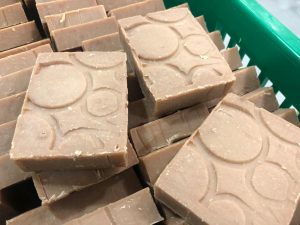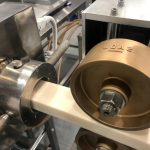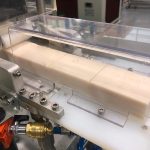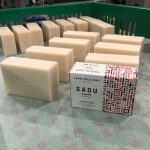Dubai – When you go to Dubai for business or vacation, the time to buy a souvenir for friends and family tends to be a moment of questionable choices. An unsuspecting tourist may end up taking a product made in China, Vietnam or Indonesia from the souvenir shops that offer a whole world of trinkets from magnets to card decks, decoration objects, shot glasses, stuffed animals, pens and t-shirts.
The options of products made in the United Arab Emirates are few and turn out to be the best. One is the camel milk soap by The Camel Soap Factory (TCFS). Sold in the Duty Free, gift shops, and supermarkets, the product is sustainably handmade with local, natural, high-quality ingredients, with no chemicals or dyes, no palm oil, and zero waste.
The soaps are beautiful and fragrant in the right measure; the Arab world usually has extremely intense scents – poor noses! Besides being a UAE-made gift, the soap is one licensed product of the Expo 2020 to start in October in Dubai.
This ANBA reporter was in the camel milk soap factory in Dubai Silicon Oasis technology park last February and followed the soap manufacturing process. Founded in 2013, the company owned by South African expatriate Stevi Lowmass has grown by an average of 90% a year and can now produce 100,000 soaps a month.
“It’s a lovely product of the Middle East and one of the few products for tourists made in Dubai, and as far as we can they are made with local products, with a minimal environmental footprint,” said the company’s marketing manager Dave Esmonde-White, who accompanied ANBA during the tour.
The main ingredient
The frozen and pasteurized camel milk is delivered to the factory from a local farm around 80 kilometers away. “When you think milk, you think cows, but the camel milk process is very different. The camels stay with their offspring, suckle them and, if the female camels aren’t happy, they don’t produce any milk,” White said. The milk is kept frozen for a health issue.
The idea to work with camel milk was Lowmass’, who wanted to use a local, different product in her soaps. “We now know that the came milk makes wonders for the skin and general health. It’s denser and saltier; it takes getting used to. When you think that the camel lives in an inhospitable environment, you get that the camel milk is full of nutrients, proteins, vitamins and minerals,” he said.
In addition to being great for the skin and health, the camel milk is good for those with cow milk allergies, too. “The cow milk has two proteins that can cause allergies, while the camel milk has none. They say the camel milk is considered the most similar to the human milk,” White says.
The preparation
The marketing manager said that the soap manufacturing process is like cooking or baking. The camel-milk base is mixed to vegetable oils in a specific manner. The soap bars have 25% to 30% if camel milk in their composition. The vegetable oils used are coconut oil, olive oil, shea butter, and more.
The entire process is manual. The mix is put into a mold as a large soap block. It rests for around a day until it hardens, and then it’s manually cut into soap bars. The bars are stamped one by one with the camel logo and the batch goes to a resting room, where they remain for six weeks until they cool off and dry.
The soap batch being manually cut: A visual pleasure. (Bruna Garcia/ANBA)
“When the soap hardens, it generates heat, so we must put it to rest until it’s completely hardened and dry,” he explained.
The logo stamped on the soaps, White says, was the subject of long debates until they reached the current design. “We love our logo. It’s a camel under a moon or sun; we know the camel has only one hump, but for an artistic reason ours has two,” he said.
Then the bars are packed into a burlap or cloth bag with the company’s logo, which says the soap collection and aroma and may be reused to store coins or jewelry, for example.
The company now offers the Heritage Collection, with four aromas that pay tribute to the UAE – Majlis, Sea, Oasis and Souq; Oriental Collection, with Oud and Aromatic Wood aromas; Castile Collection, with more classic aromas such as Lavender & Geranium, Orange and Cinnamon, Lemongrass, Rosemary & Mint, and more.
There’s still a soap for delicate skin and a skincare collection with more complex formulae with up to six oils. It’s offered in three options, including Charcoal Detox, made with activated carbon. The black bar is recommended for oily and acne-prone skins. “Depending on what we put in the soap, it gets a different color – we use no dyes; they are the essential oil’s colors, and in the case of the unscented soap, we get the camel milk color, which is beige,” he said.
The soaps by The Camel Soap Factory weigh from 95 to 140 grams and prices range from AED 32 to 45 (USD 9 to 12).
“We manufacture around four tons of soap a year on demand,” White says. The factory has a capacity to produce 6,800 soap bars a day.
(Story continues after photo gallery)
Expo 2020
For Dubai Expo 2020, there’re now five soaps being sold at the company’s website with aromas specifically designed for the licensed products for the event to start in October. They’re Honey & Milk, Mandarin & Pepper, Mukhallat, Musk and Jasmin.

But White says one of the aromas will be ruled out – he didn’t say which – and by July they’ll launch a second phase of the products with four other soap bars, one hand lotion, one body lotion, and four lip balms. “We reached out to them, and they reached out to us. There’s a mutual admiration,” he says.
The stamp made exclusively to the Expo will be remade. “We really like this stamp, but since it’s a handmade product, after the soap dries the cutout didn’t meet our quality standards. We’re reviewing it, and the Expo crew agreed to change it into something more centralized,” White said.
The manager said that the Expo sought out The Camel Soap Factory as they are a local company that offers products that translate part of the UAE culture and aromas. “They love us, and we love them,” he said.
Sadu
A new, more accessible line was recently launched by TCSP. Sadu soap bars are made in the same factory and use ingredients of the same quality of the other bars by the company. The difference is that their workmanship is not manual. The soap mix goes to a machine that cuts the bars and stamp them with the Sadu name, and the product can immediately be packed into a little box. The production capacity is 800 soap bars an hour, and the line is sold in Carrefour supermarkets of the emirate.
“This line is named after the Dubai neighborhoods and comes in four aromas: Jumeirah, Downtown, Creek and Desert. Jumeirah is one of Dubai’s oldest neighborhoods and we wanted to give it a cozier aroma, while Desert is fragrance-free, and smells like the camel milk, quite neutral,” White said.
The Sadu soaps weigh 130 grams and cost AED 15.75 (USD 4.29) on the company’s website.
(Story continues after photo gallery)
Zero waste
As it’s an artisanal process, some soap bars don’t meet the company’s quality standards. The imperfect ones are sold in bulk for a smaller price on the company’s website. They’re reused 1-kg boxes of soap bars of your choice for AED 50 (USD 14). “Sometimes the soap dough generate heat and can create a crack, and depending on the oil used, may have more than one crack, as is the case of the cinnamon oil,” White said.
The manager said that one batch usually produces 300 soap bars. “Over the years, we have enhanced the recipes so that we had less cracks and less waste,” he said.
Markets
Designed for the gift market, the soap bars received orders from the country’s supermarkets and are exported to countries such as Sweden, France, Germany, Switzerland, Thailand, Japan and China, the focus of their exports now.
For Brazil, White said he had interested customers, but the heavy weight of the bars is a logistic deal breaker. He hopes Brazilians come to Dubai, get to know the product and buy it to take it as a gift. “It won’t break or spill in your bag, and when you arrive home and open your bag, you’ll smell your memories from Dubai. It’s a piece of the Arab world in a little package,” he finished.
Where to find
You can find TCSF soap bars at the Duty Free of every Dubai International Airport, Abu Dhabi Airport, and Oman Airport terminals. The largest resellers are the Carrefour supermarket in the UAE, and Spinney and Waitrose in Dubai, Abu Dhabi, Al Ain, and other cities. The products are also sold in every Al Jaber Gallery gift shop – there are several across the city’s malls – and a series of tourist spots such as on top of Burj Khalifa, Atlantis Palm gift shop, Abu Dhabi Great Mosque, and soon Dubai Frame. They’re also available on the gold and spice souks. You can buy them online on the website.
The company also makes soaps for corporate events with companies’ logos, as well as weddings, baby showers, and other special events.
Translated by Guilherme Miranda
























